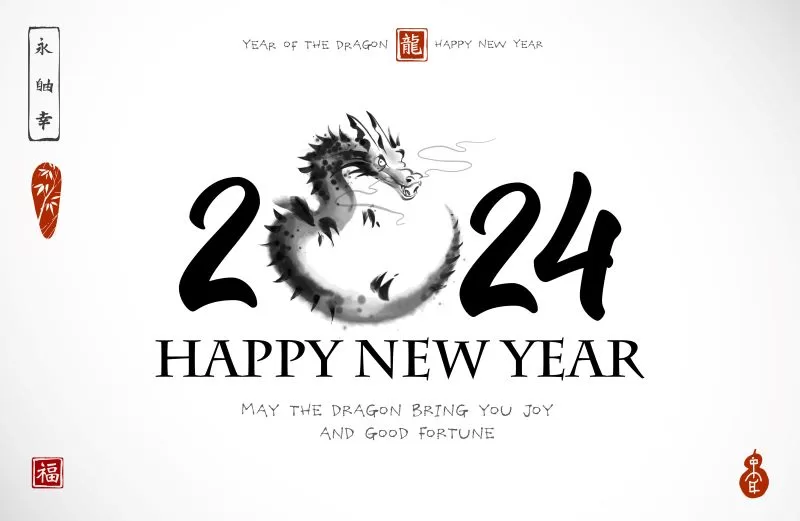
Get ready for the year of the dragon! The dragon is considered the most powerful and auspicious sign in the Asian lunar zodiac cycle, and this mythological marvel is roaring in on February 10.
Lunar New Year is often called Chinese New Year, but this important holiday is celebrated throughout much of Asia and around the world. Unlike the fixed January 1 start date for Western New Year’s Day, Lunar New Year is a movable feast, usually occurring on the day of the second new moon following the Winter Solstice—between January 21 and February 20.
The Chinese calendar is cyclical, not linear, and it is tied to the 12-year cycle of the zodiac. Each year is associated with one of 12 animals and five elements. The Rat, Ox, Tiger, Rabbit, Dragon, Snake, Horse, Goat, Monkey, Rooster, Dog, and Pig are combined with the elements wood, fire, earth, metal and water.
Lunar New Year is the most significant holiday of the year in China, where it initiates a fifteen-day festival, but this holiday is also observed in Vietnam, South Korea, parts of Japan, and many places worldwide where there is a significant Asian population.
Although all of the animals in the Chinese zodiac have positive aspects, the dragon is considered one of the luckiest. Children born in the year of the dragon are thought to have a little bit of extra luck, and to also share the dragon’s courage, strength, and grace.
Lunar New Year traditions include wearing red, and giving gifts of money in red envelopes. Debts are traditionally settled and quarrels are resolved before the New Year, and families decorate their homes with red paper lanterns and streamers, and golden flowers like chrysanthemums and orchids. The Lunar New Year tradition of decorating with chrysanthemums has become so popular that they are often available at grocery stores in the Los Angeles area, decorated with the traditional red tag with new year’s wishes.
Food is an important part of the holiday throughout Asia and is an easy way for everyone to participate in Lunar New Year. Oranges and tangerines; spring rolls; dumplings; and noodles are all considered especially lucky.
While it’s traditional to clean house before the new year, it’s bad luck to clean on New Year’s Day—February 10 this year—because one might sweep one’s good luck away, and its considered auspicious to enter the new year with a grateful heart, to insure blessing and happiness in the year ahead.
The Dragon, in Chinese, “Lung,’ or “Loong.” is the fifth of twelve animals in the Chinese calendar cycle. It’s one of just two animals that are mythological—the other is the sheep/goat. This year’s dragon is associated with the element wood, which should temper the dragon’s energy, and channel it into growth and abundance, but dragons are powerful, driven, and sometimes unpredictable. This year could be a wild ride.
Unlike its fire-breathing, treasure-hoarding cousin from European mythology, the Asian dragon is a divine animal associated with the gods. It breathes clouds, not fire; brings rain, not destruction; and bestows luck. If 2023 was a rough year, or if 2024 has gotten off to a rough start, the Year of the Dragon offers a new beginning, a chance to change one’s fortune and embrace abundance.
Happy Year of the Dragon!
Celebrating the Year of the Dragon
In Los Angeles, the annual Chinese New Year parade and festival in Chinatown is one of the oldest festivals in the city—this year is the 125th annual event. It features the celebrated Golden Dragon Parade, from Hill Street to Broadway at Cesar Chavez, on Saturday, February 17 from 1 to 3:30 pm., and a free festival with music, dancing, and crafts at the fCentral Plaza. This is a huge event that has a major impact on traffic. It’s a good idea to arrive early and be prepared to stay all day. http://www.lachinesechamber.org/125th-gdp
The USC Pacific Asia Museum in Pasadena is celebrating Lunar New Year on February 10, with a free afternoon of pan-Asian activities, including lion dancers, martial arts and classical Chinese music, as well as free admission to the museum. https://pacificasiamuseum.usc.edu
The Huntington Library and Botanic Garden events are not free, but they are well worth the cost of admission. Taking place in the spectacular Chinese garden on February 10-11, this two-day event will feature lion dancers, mask-changing performances, martial arts, Chinese music and traditional Lunar New Year’s culinary treats: https://huntington.org/chinese-new-year-festival
Here at TNT, one of our favorite places for delicious bao, dumplings, and noodles to celebrate Lunar New Year is Eloong, a small, family-owned restaurant in Westlake Village that offers in-restaurant dining and excellent take-out, with many vegan options. https://www.eloongdumplingswv.com/our-vision




